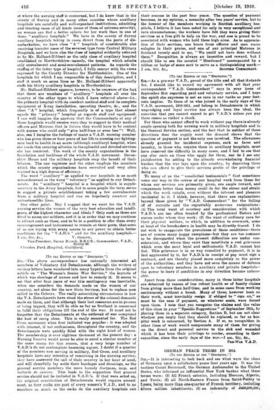[To THE EDITOR OF THE " SPECTATOR.") SID, — The above correspondence
has naturally interested all members of Voluntary Aid Detachments, although the writers of various letters have wandered into many bypaths from the original article on " The Woman's Senior War Service," the keynote of which was shortage of nurses and how to remedy it. It seems to me that after four years of war this ocrntingency was inevitable, when one considers the demands made on the women of our country; not alone for the new State Services, but to replace men called to the Colours. The really astonishing circumstance is how the V.A. Detachments have stood the stress of the colossal demands made on them, and that although their last resources are in process of being tapped, they will be able as far as Scotland is concerned to fulfil their obligations till the end of the war. It must not be forgotten that the Detachments at the outbreak of war oomprised the best of every class. This is easily accounted for. The Red Cross movement when first initiated was popular : it was adopted with interest, if not enthusiasm, throughout the country, and the Detachments were quickly filled with the right kind of woman. The membership is over eighteen thousand at the present day : a Nursing Reserve would never be able to enrol a similar number of the same stamp for this reason, that a very large number of V.A.D.'s do not contemplate becoming nurses. I doubt if a quarter of the members now serving in military, Red Cross, and auxiliary hospitals have any intention of remaining in the nursing service; they have answered the call of their country in her hour of need, and will cheerfully lay aside their bandages and dressings, as the general service members the more homely dustpans, mop, and batterie de cuisine. This leads to the suggestion that general service should not be included in V.A.D.'s. If that were acted on, the original constitution of Detachments would require amend- ment, as four cooks are part of every women's V.A.D., and to no members so much as the cooks do the auxiliary hospitals owe their success in the past four years. The -question of payment becomes, in my opinion, a necessity after two years' service, but to the honour of the members working in Scottish auxiliary. hos- pitals, I believe it has been asked for only in very exceptional and rare circumstances; the workers have felt they were giving their services as a free gift to help on the war, and one is proud to be associated with women who hold these high aims. As to apprecia- tion of their services, one hears from officers and men warm eulogies in their praise, and one of our principal Matrons in Scotland tersely said to me, "We could not have done without them." Recognition is always an incentive and reward, but I should like to see the coveted " Mentioned" accompanied by a ribbon or badge of some sort to serve as a distinguishing mark.—


































 Previous page
Previous page